#espresso bar
Explore tagged Tumblr posts
Text

My Birthday Cake
From Ferrara's website: Ferrara’s specialty tiramisu features homemade Savoiardi (Ladyfinger cookies) that they douse with espresso & coffee liqueur and layer with sweet mascarpone. Ferrara is one of New York's most iconic shops and its first Italian Bakery, founded in 1892 in Little Italy. As America's first Pasticceria and espresso bar, it was only natural that people came primarily for the coffee, cookies and cakes, and despite the many changes in the neighborhood over the decades, their offerings are still wowing everyone who walks through the door, instantly transporting them to Southern Italy.
They have been featured on the Food Network's "Best Things I Ever Ate," The New York Times, New York Magazine and just about every media outlet imaginable.
“You are never too old to set another goal or to dream a new dream.” — C.S. Lewis
#food#italian food#italian dessert#dessert#cold food#cold dessert#tiramisu#pick me up#cheer me up#celebration#birthday#birthday cake#cake#tiramisu cake#italian bakery#pasticceria#espresso bar#new york#little italy#my photography#food photography#original photography#thelcsdaily#february baby#my birthday#ferrara bakery
447 notes
·
View notes
Text

Ren Kaffe
16 notes
·
View notes
Text
My coffee station.
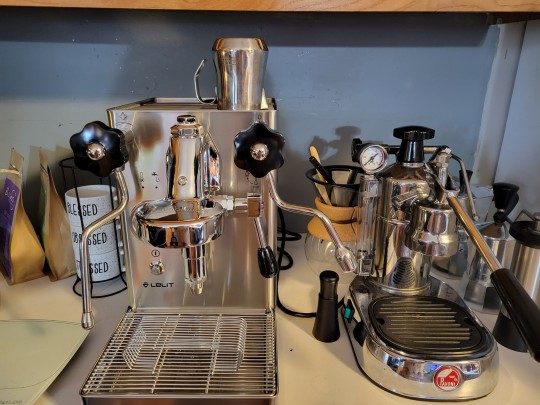
24 notes
·
View notes
Text

Coffee break after school, relax, de-stress.
🤎⚡️🤎☕️🤎🔋
#coffee#coffeelover#coffee break#brugge#belgium#espresso bar#coffee date#aestheitcs#barista#latte macchiato
21 notes
·
View notes
Text
Discover the Perfect Coffee Shop Experience at Records Coffee
In today’s fast-paced world, finding the right coffee shop is about more than just your daily caffeine fix — it's about embracing a space where great taste meets great vibes. Whether you’re a coffee lover, remote worker, or someone who simply enjoys a cozy café atmosphere, Records Coffee brings something truly special to the table.
Explore their unique offerings at www.recordscoffee.in. Records Coffee isn’t just another coffee shop — it’s a creative blend of premium brews, music culture, and a passion for quality. With beans sourced ethically and roasted to perfection, each cup delivers a rich, flavorful experience that stands out.
What makes Records Coffee even more memorable is its fusion of coffee and culture. Inspired by vinyl records and indie aesthetics, the brand offers more than just beverages — it creates moments. From curated coffee subscriptions and specialty blends to brewing gear and gifting options, everything you need is just a click away.
The website offers a seamless coffee shopping experience, whether you’re starting your coffee journey or looking to level up your home brewing game. With detailed product descriptions, brewing tips, and expertly crafted blends, Records Coffee ensures you enjoy café-quality coffee anytime, anywhere.
So, if you’re searching for a coffee shop that combines craftsmanship, creativity, and culture, visit Records Coffee. It's not just a place — it's a movement for those who take their coffee seriously.
#coffee shop#cafe in Mumbai#cappuccino near me#iced coffee near me#local Mumbai coffee#coffee shops with Wi-Fi near me#coffee#Best coffee shop#Local coffee shop#Coffee cafe#Coffee takeout near me#Cozy coffee shop#Espresso bar#Organic coffee shop#Coffee and snacks#Coffee with free WiFi#Coffee shop for meetings#Breakfast and coffee#Coffee shop with desserts#Best latte near me
0 notes
Text
Scopri Menabò Caffè, torrefazione di Alessandria specializzata in miscele artigianali, capsule compostabili e caffè di qualità.
#Alessandria today#aroma intenso#caffè Alessandria#caffè artigianale#caffè come stile di vita#caffè di qualità#caffè e territorio#caffè etico#caffè in capsule#caffè italiano#caffè monorigine#caffè per ristorazione#caffè Piemonte#caffè sostenibile#caffè specialty#capsule compatibili#capsule compostabili#chicchi Arabica#chicchi selezionati#cialde compostabili#Cultura del caffè#design e caffè#eccellenza artigianale#esperienza sensoriale#Espresso#espresso bar#Google News#gusto italiano#italianewsmedia.com#Lava
0 notes
Text
The Canal Market, 600 Mildred Ave, Venice, CA 90291

This little bodega carries high quality, locally sourced goods (and some quality goods that aren’t local). It looks for ethical and sustainable products. It feels very Venice Beach. You can buy prints of Venice Beach photographs, hand-knit scarves, vintage dishes, pieces from a local potter, etc.
They have beautiful flowers (expensive though), wine and spirits, cheese, espresso bar, baked goods and sandwiches from Farmshop, candles, personal care items, Jyan Isaac bread, Jeni’s Ice Creams, Swedish candy, pantry goods, hair clips, greeting cards, Mom’s Products hummus (the stuff you get at a farmers market), nd great coffee. They serve Amigo Coffee, a local roaster that I haven’t tried. They have all kinds of interesting snacks, little gifts, etc.
My picks:
Farmshop ham & swiss baguette sandwich ($15.50): quality ingredients but it was refrigerated so it wasn’t as good as a freshly made sandwich from Farmshop, plus it was very expensive for a premade sandwich
Bon Bon bag of gummies, $3
Check out the lovely patio in the back. Oh and Farmshop day old pastries are 50% off! And the building is cute and close to the Venice Canals.
4.5 out of 5 stars
By Lolia S.
#The Canal Market#specialty grocer#grocery shopping#local products#Venice Canals#Venice California#espresso bar#snacks#grocery bodega#Farmshop LA
0 notes
Text
New Post has been published on
New Post has been published on https://coffeetongue.com/how-espresso-bars-serve-as-the-heart-of-italian-neighborhoods/
How Espresso Bars Serve As The Heart Of Italian Neighborhoods
The Role of Caffè in Building Community Bonds in Italian Neighborhoods
In Italy, the aroma of fresh espresso wafts through the streets, drawing people to local coffee shops. These espresso bars are not just places to grab a quick caffeine fix; they play a vital role in the fabric of Italian communities. The interaction that occurs within the cozy confines of these cafés fosters bonds among neighbors, enriching the community spirit.
When you step into an espresso bar in an Italian neighborhood, you’re immediately enveloped by a warm atmosphere filled with laughter, conversation, and, most importantly, the sound of steaming milk and grinding coffee beans. Here, you’ll find men and women of all ages sharing stories, news, and laughter over cups of steaming espresso. This daily ritual forms strong social ties among patrons, reinforcing a sense of belonging.
Espresso bars act as communal hubs where both old friends and strangers come together. The typical Italian morning often begins with a quick stop at a local coffee shop. You can enjoy a rich espresso while exchanging a friendly nod or a brief chat with someone you know—or even make a new friend. This simple act of reaching out, sharing a smile, or discussing the day’s news brings people closer. Every interaction opens the door to a deeper connection.
Another community benefit of espresso bars is their role in local culture. They serve as the backdrop for local events, celebrations, and gatherings. Many neighborhoods hold regular events at these cafes, such as book clubs, art shows, or music performances. This platform allows local artists and community members to showcase their talents, sharing in the collective pride of their neighborhood.
Additionally, many espresso bars pride themselves on using local ingredients, creating beverages that reflect the tastes and preferences of the community. When you sip on a cappuccino crafted with locally sourced milk or a pastry made with fresh ingredients, you are not only savoring flavors unique to the region but also supporting local farmers and entrepreneurs. This connection to local produce fosters a greater sense of community and encourages responsible consumption.
Daily Rituals: Many locals visit the same espresso bar every morning, forming a daily routine that builds familiarity and comfort.
Social Events: From poetry readings to live music, espresso bars actively promote neighborhood events that cultivate connections among residents.
Support for Local Economy: The emphasis on local ingredients helps strengthen bonds between businesses and patrons, encouraging loyalty.
Shared Experiences: Whether it’s watching a football match or celebrating a holiday, espresso bars bring people together for shared joys.
Moreover, espresso bars in Italy often act as informal meeting points for community leaders and residents. This collaborative environment promotes discussions about local issues, community projects, and solutions. By fostering open dialogue, espresso bars empower residents to participate in the neighborhood’s growth and well-being. Here, aspirations for improvement and progress are often discussed over a cup of espresso, leading to collaborative efforts toward communal goals.
The informal yet engaging atmosphere of espresso bars provides an ideal setting for building friendships and fostering relationships. It’s not uncommon for a regular patron to be greeted by name or for baristas to remember your usual order. This personal touch transforms a simple coffee run into a more intimate experience, encouraging connections that may last a lifetime.
As you immerse yourself in the vibrancy of an Italian espresso bar, it becomes clear that these cafes are more than just places to enjoy coffee. They are heartbeats of their communities, nurturing relationships and fostering a sense of belonging among patrons. From forming lasting friendships to engaging in lively discussions, espresso bars enrich the social fabric that intertwines neighborhoods across Italy.
So the next time you find yourself in an Italian neighborhood, take a moment to step into an espresso bar. Engage with those around you, share a laugh, and let the ambiance envelop you. You’ll soon discover that with every sip of your espresso, you’re not just enjoying a drink; you’re becoming part of a rich tapestry woven together through community, culture, and connection.
Cultural Traditions Celebrated at Espresso Bars
Espresso bars play a pivotal role in Italian culture, serving as social hubs where traditions are cherished and celebrated. They are much more than places to grab a quick caffeine fix; they are vibrant community spaces where people come together to share stories, laughter, and experiences. Let’s dive into the various cultural traditions that blossom at these beloved cafés, creating a unique atmosphere that embodies the heart of Italian neighborhoods.
Espresso Rituals
Every visit to an espresso bar includes an unspoken ritual that locals adhere to. The act of ordering and enjoying a coffee is somewhat sacred. Here are some key rituals associated with espresso:
Standing at the Bar: Italians often drink their espresso standing up. This habit fosters quick interactions and enhances the communal vibe.
Ordering Specificity: The way you order can communicate your familiarity with the café culture. A simple “un caffè” (a coffee) is enough.
The Importance of Timing: Italians typically enjoy their espresso in the morning or early afternoon. Ordering a cappuccino after 11 AM is a cultural faux pas for many.
Festive Occasions
Espresso bars often become the backdrop for local festivals and celebrations. These occasions draw the community together, reinforcing social bonds. Here are some examples of how espresso bars are woven into the fabric of communal festivities:
Christmas Celebrations: During the holiday season, espresso bars might serve special holiday-themed drinks infused with flavors like cinnamon or almond, creating a festive atmosphere.
Local Festivals: Many towns celebrate local traditions with fairs where espresso bars serve their offerings, often featuring local desserts and pastries.
Cultural Days: Special cultural or historical days see espresso bars filled with local pride. The community gathers to reminisce and toast to their shared heritage.
Community Gatherings
Espresso bars serve as natural meeting points for locals. Whether it’s catching up with friends, conducting business meetings, or celebrating life events, these establishments enable connections. The significance of community gatherings is profound, as they encourage:
Social Interaction: The ambiance in these bars fosters conversations and nurtures friendships among locals.
Support for Local Artisans: Espresso bars often showcase local artworks or host live music, encouraging patrons to appreciate homegrown talent.
Civic Engagement: The gathering spots are used for community discussions about local issues, helping to shape neighborhood decisions.
Food and Drink Traditions
Complementing the espresso experience is an array of traditional foods often served alongside. Local pastries and snacks enhance the flavors of coffee, creating a richer experience. Key accompaniments often include:
Cornetti: A flaky pastry filled with cream or jam, enjoyed with a shot of espresso.
Panettone: During the festive season, many espresso bars serve this sweet bread, adding to the celebratory spirit.
Biscotti: For a crunchy treat, many enjoy dunking these twice-baked cookies into their coffee.
Cultural Identity
The traditions upheld in espresso bars reflect a broader cultural identity that Italians cherish. Coffee is not just a beverage; it symbolizes warmth, hospitality, and community spirit. Through the shared moments spent at these bars, the essence of Italian culture thrives. This communal atmosphere helps preserve customs passed from generation to generation.
Espresso bars are vital cultural institutions in Italian neighborhoods. They are places where rituals are performed, traditions are celebrated, and community is strengthened. From the morning rush of local patrons to the evening gatherings of friends, these cafés truly serve as the heart of the neighborhoods they inhabit.
The Evolution of Espresso Bars in Modern Italian Society
Espresso bars are much more than just places to grab a quick caffeine fix. They have evolved into vibrant community hubs in Italian neighborhoods, reflecting the culture, lifestyle, and spirit of the people. Understanding the metamorphosis of these beloved establishments reveals just how integral they have become to modern Italian society.
The Roots of Espresso Bars
The journey of espresso bars dates back to the early 20th century. Initially, these small cafes served as social gathering spots where people could connect over a cup of coffee. The invention of the espresso machine revolutionized coffee drinking, allowing patrons to enjoy rich, concentrated coffee. This innovation quickly caught on, leading to the simple yet captivating experience of having an espresso at the bar, usually while standing.
Espresso Bars and Daily Life
For many Italians, the day doesn’t begin until they’ve had their morning espresso. Often, these bars become a part of daily rituals, serving as the first stop for countless locals. Here are a few reasons why espresso bars are central to everyday life:
Social Interaction: Espresso bars promote social interaction, where friends meet to catch up, families connect, and the community gathers.
Cultural Experience: Each bar reflects its neighborhood’s character, offering a taste of local culture through its unique ambiance, decor, and menu.
Convenient Locations: Typically found in bustling city corners, these bars are designed for busy lives, allowing for quick visits without sacrificing the coffee experience.
Changes in Modern Society
The evolution of espresso bars has mirrored changes in modern Italian society. With globalization and the rise of the coffee culture beyond Italy, espresso bars have adapted to meet new demands. Here’s how:
Diverse Offerings: While traditional beverages like espresso and cappuccino remain staples, many bars now offer various specialty drinks to cater to diverse tastes.
Inclusive Spaces: Today’s espresso bars are becoming more inclusive, providing settings for cultural events, art displays, and live music, drawing in a larger, more varied crowd.
Digital Integration: With the use of technology and social media, espresso bars now have an online presence, facilitating community engagement and attracting younger generations.
The Role of Espresso Bars in Community Building
Espresso bars play a crucial role in fostering community ties. They often act as informal meeting spots where locals discuss neighborhood issues, celebrate events, or simply enjoy idle chatter among friends. The constant hum of conversation, laughter, and the clang of cups creates a welcoming and familiar atmosphere.
Moreover, many espresso bars partner with local businesses, showcasing products from nearby artisans or hosting food nights featuring local delicacies. This not only strengthens community bonds but also helps preserve local culture. By supporting such establishments, customers invest directly in their community.
Espresso Bars in Transition
As Italian society becomes more health-conscious, some espresso bars are evolving their menus to cater to these changing preferences. Options like plant-based milk, low-sugar syrups, and organic beans illustrate how these bars respond to customer wants. They provide a space where tradition meets modernity, allowing older and younger generations to connect over seemingly opposing yet harmonious tastes.
The Future of Espresso Bars
Looking ahead, espresso bars appear set to maintain their significance within Italian neighborhoods. As more people acknowledge the benefits of slowing down and building community, these establishments will likely play a pivotal role in creating spaces where relationships thrive.
The evolution of espresso bars symbolizes the bridge between Italy’s rich cultural heritage and its modern societal shifts. By continuing to serve as social hubs, these bars fulfill essential needs for connection, convenience, and community, solidifying their place as vital assets in Italian society.
Unique Features of Neighborhood Espresso Bars That Foster Social Interactions
Espresso bars are more than just places to grab a quick coffee. They are vibrant hubs within Italian neighborhoods, each with its unique charm that encourages social interactions. Here’s a closer look at the features that make these establishments essential parts of their communities.
Warm Atmosphere
As soon as you step into an espresso bar, the inviting aroma of freshly brewed coffee surrounds you. The warm and cozy environment is designed to make guests feel at home. Many bars incorporate comfortable seating arrangements where people can linger over drinks. This comfortable setting encourages you to sit down, relax, and engage in conversation with friends or even strangers.
Open Layout
The open layout commonly found in many espresso bars promotes interaction. Unlike some cafes where tables are tucked away in corners, espresso bars tend to have counters where people can stand and chat. This kind of arrangement makes it easier for you to strike up a conversation with a barista or fellow customers. Here’s how an open layout fosters social interactions:
Encourages Group Gatherings: Large tables allow groups to gather and share stories over coffee.
Promotes Casual Chats: Standing at the counter, you can easily spark conversations about the day’s events.
Inclusion of a Community Board: Many establishments feature a bulletin board for local events, which serves as a conversation starter.
Personalized Service
Baristas in espresso bars often cultivate relationships with regulars, remembering their names and favorite drinks. This personalized service adds a layer of connection, making you feel valued and recognized. When you enter an espresso bar and are greeted with a friendly smile and a “Welcome back! The usual?” it sets a positive tone for the day. This connection not only makes customers feel appreciated but also encourages them to return and engage with both staff and other patrons.
Community Events
Many neighborhoods host events at local espresso bars, from open mic nights to art displays. These gatherings provide perfect opportunities to meet and interact with others in a relaxed setting. It’s not uncommon for an espresso bar to feature:
Local Musicians: Live performances can energize the environment and draw in crowds, encouraging mingling.
Book Clubs: Regular meet-ups for local book enthusiasts allow for discussions and building friendships.
Art Exhibitions: Showcasing local artists can stimulate conversations about art and culture.
Cultural Rituals
Espresso bars often echo traditional Italian customs, making them more than just a place for coffee. The act of enjoying a quick espresso while standing at the bar is a ritual that encourages community bonding. This cultural practice promotes:
Shared Experiences: Caffeine lovers can enjoy a moment together at the bar, fostering a sense of belonging.
Celebration of Heritage: Traditional practices are often embraced, encouraging patrons to engage in cultural discussions.
Social Media Influence
In today’s digital age, espresso bars have embraced social media to expand their reach and foster community connections. Many bars create Instagram accounts to showcase their delicious offerings and unique events, inviting followers to visit and join the community. Posts featuring customers enjoying their time inside the bar create a welcoming atmosphere that fosters social interactions online and offline.
Local Collaborations
Espresso bars frequently collaborate with local businesses to enhance their menus and events. By featuring local pastries or hosting workshops with neighborhood artisans, these bars not only support local entrepreneurs but also create a tight-knit community network. This collaboration draws in diverse crowds and encourages conversations between local residents and newcomers alike.
Espresso bars serve as essential pillars of Italian neighborhoods, facilitating social interactions through their unique features. Whether it’s through the inviting atmosphere, open layout, or community-driven events, these establishments truly embody the spirit of connection and culture. So, next time you step into an espresso bar, take a moment to appreciate the vibrant interactions happening around you. You might just discover a new friend over your favorite cup of coffee.
How Caffè Influences Local Economy and Community Development
Caffè is more than just a beverage in Italian culture; it is a lifeblood that fuels not only social interactions but also local economies. In bustling cities, quaint villages, and everything in between, espresso bars serve as more than just places to grab a quick drink. They form the heart of neighborhoods, playing a vital role in community development and economic vibrancy.
At the core of every Italian neighborhood, the caffè shop fosters social connections. Patrons of differing backgrounds mingle, discussing local events, and sharing stories. The espresso bar becomes a gathering spot where friendships blossom and community ties strengthen. This social aspect is essential, contributing to a sense of belonging and encouraging civic engagement. When you step into a café, you’re stepping into a microcosm of the local culture.
But the influence of caffè extends beyond social interaction. These establishments are critical players in the local economy. Here’s how:
Job Creation: Espresso bars employ a significant number of locals. From baristas to managers, the workforce stimulated by these businesses helps keep the economy robust.
Supporting Local Suppliers: Many caffè shops prioritize sourcing ingredients locally, such as coffee beans, pastries, and dairy. This creates a flourishing network of local farmers and producers who benefit from steady demand.
Attracting Tourists: Caffè culture is often a draw for travelers. Tourists seek authentic experiences, and local espresso bars provide a taste of true Italian hospitality. This influx of visitors can boost sales and enhance the neighborhood’s commercial viability.
Boosting Real Estate Values: Vibrant espresso bars can enhance neighborhood charm, making areas more desirable for new residents and businesses alike. Increased demand for local property can drive up market values.
Moreover, caffè serves as an incubator for local entrepreneurs. Many aspiring business owners start in a café setting, testing ideas and gathering feedback from community members. This collaborative environment can lead to innovative products and services, strengthening the local economy further. The communal atmosphere encourages not just competition but cooperation, fostering a culture of entrepreneurship that benefits everyone.
In addition, espresso bars create a “third place.” A third place refers to a social setting separate from home (the first place) and work (the second place). These spaces provide a unique venue for people to unwind, study, or simply enjoy their surroundings. By enhancing the local quality of life, caffè bars play a crucial role in retaining residents. People are more likely to settle in areas with accessible and inviting community spaces.
Consider how these coffee shops often host events, from local art exhibits to themed nights, attracting larger crowds and creating a buzz within the community. Such activities cultivate a vibrant local culture and encourage community participation. Regular events also lead to loyal customers who appreciate the cafés for their commitment to local engagement.
The influence of caffè on community development cannot be overstated. As local economic engines, simmering with social interactions, they play a critical role in ensuring neighborhoods thrive. By integrating various facets of local life—work, leisure, and culture—espresso bars serve as crucial elements in shaping vibrant communities.
Furthermore, we must not forget the evolving landscape of caffè culture. With the rise of coffee enthusiasts, the demand for quality and specialty coffees has increased. Espresso bars have responded by investing in artisanal techniques and ethical sourcing. This shift boosts the economy as it opens avenues for local roasters and specialty suppliers, expanding the economic impact of the caffè community.
Caffè is much more than just a drink. It embodies the spirit of community and serves as an indispensable component of local economies and development. From social cohesion to economic growth, the influence of espresso bars is vast, echoing in the lives they touch and the neighborhoods they help thrive.
Conclusion
Espresso bars are much more than simple places to grab a coffee; they are vital hubs that nurture community connections in Italian neighborhoods. The daily ritual of enjoying a caffè binds friends, families, and even strangers together, fostering a sense of belonging. In these vibrant spaces, cultural traditions come alive, from lively discussions over a macchiato to celebrating local festivals, each sip steeped in rich history and shared experiences.
As modern society evolves, espresso bars have adapted while maintaining their essence. They now cater to a diverse crowd, balancing time-honored customs with contemporary trends. This evolution encourages a blending of cultures within the community, offering everyone a place to connect and interact. Unique features, such as communal tables and open-concept designs, further promote social engagement, allowing individuals to easily strike up conversations and make new friends.
The influence of caffè on the local economy cannot be overlooked. These bars provide jobs, support local agriculture by sourcing quality beans, and enhance the charm of neighborhoods that attract visitors and new residents alike. By investing in the community, they help stimulate growth and development while preserving the rich tapestry of cultural life.
Ultimately, the espresso bar stands as a testament to the power of a simple cup of coffee. It weaves together personal stories, traditions, and economic vitality into a cohesive fabric that celebrates community spirit. Through caffè, Italian neighborhoods continue to thrive, ensuring that everyone feels right at home.
#Articles#beans#best thing ever#Beverage#blog#blogger#brew#brewed coffee#cafe#cafe clatch#cafe coffee#cafeclatch#caffeine#coffee#coffee article#coffee beans#coffee blog#coffee t-shirt#espresso#espresso bar#How Espresso Bars Serve As The Heart Of Italian Neighborhoods#Italian coffee#Italian culture#latte#machine#t-shirts#Coffee Shop#Espresso
1 note
·
View note
Text
Highly Likely, 5526 N Figueroa St, Los Angeles (Highland Park), CA 90042, 35/50

This stylish, all day casual restaurant is Highland Park’s new camping spot/meeting spot. You can order breakfast, lunch, and dinner there with coffee, tea, cocktails, and more.
Score: 35/50
Food: 5/5 – The breakfast menu has breakfast sandwiches, chilaquiles, French toast, and toasts. The lunch menu has grain bowls, sandwiches, falafel, salads, etc. The curried black rice bowl was fresh, healthy, and interesting (lots of flavors and textures). The pastries are from Friends & Family (love Friends & Family).
Coffee: 4/5 – They worked with Common Room Roasters to come up with the house coffee, which is a medium roast. The cappuccino was good though it had a bitter finish.
Wi-fi: 3/5 – Free, unlimited, not secure. It seemed fast and stable.
Ambiance: 5/5 – Bright and hip with light wood walls, concrete floors, white ceilings, a skylight, and hints of a dark orange/warm brown. The interior has a large counter where you place your order and they make the espresso drinks. You can also sit at the counter. The cocktail bar is in the outdoor patio area.
Noise: 4/5 – Loud but mellow instrumental music
Plugs: 0/5 – Didn’t see any
Parking: 3/5 – Can be a challenge but if you’re willing to walk a few blocks, you should be able to find free parking
Comfort: 3/5 – Variety of seating options, from padded counter stools to padded banquettes and chairs inside. There’s also a large outdoor patio.
Bathroom: 4/5 – Two restrooms
Art: 4/5 – None but it’s a stylish place
Tips: Place your order when you enter. They’ll bring your food and drinks to your table. You can get breakfast all day.
“Laptop Campers Unite!”
0 notes
Text
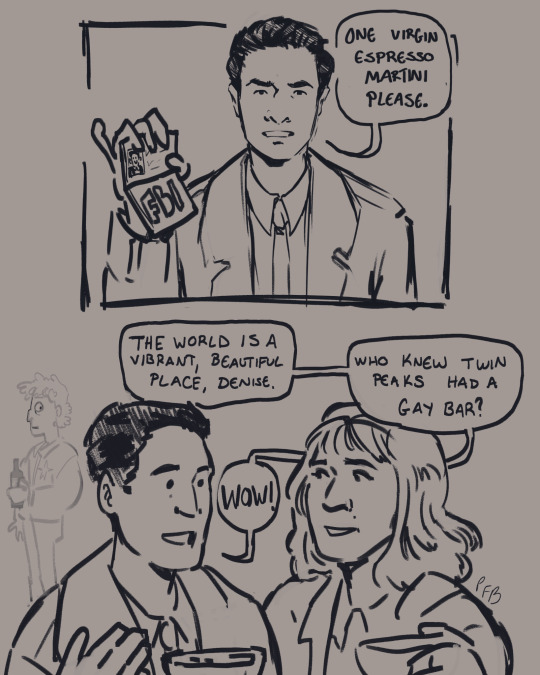
spinoff where Denise and Cooper go to the club (still directed by David Lynch)
#im only halfway through season two#no spoilers please ill FREAK OUT#no i wont ill be ok but still no spoilers#guys why are the feds at the twin peaks gay bar rn.....#twin peaks#dale cooper#denise bryson#twin peaks fanart#dream virgin espresso martini rotation#let me queen it up with you dale cooper (share factoids and information with one another)#trucoop#if you squint quite literally#my art
1K notes
·
View notes
Text
My Espresso routine ☕️😁
youtube
0 notes
Photo

Transitional Home Bar - Seated Bar Inspiration for a large transitional galley gray floor seated home bar remodel with shaker cabinets and dark wood cabinets
#game room with ceiling beams#espresso bar#grey porcelain floors#home bar ideas#dark beams in game room#espresso cabinets
0 notes
Text

Café
13 notes
·
View notes
Text
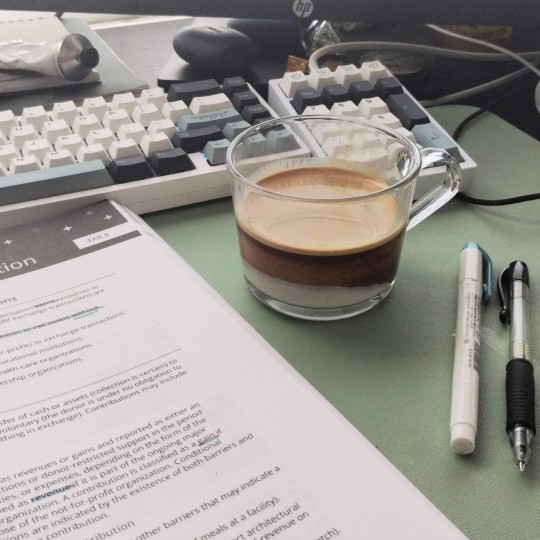


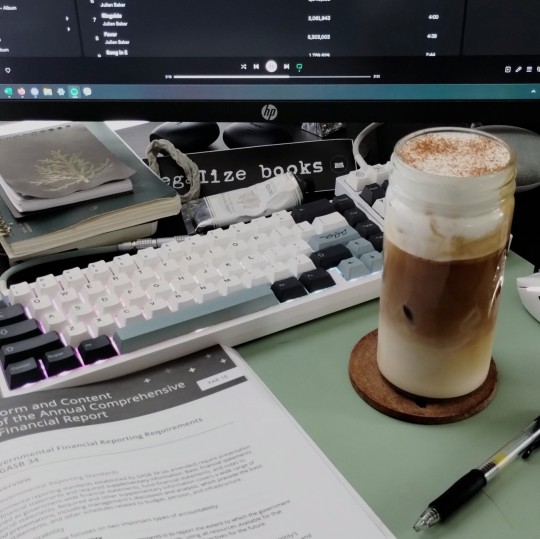
🎧 currently listening to: bobcat club by slaughter beach, dog
making tasty coffee is half my motivation to sit down and study tbh
#can you tell i used to be a barista lmao#i have an entire espresso bar in the corner of my room and its the best thing ive ever done#studyblr#study motivation#studyspo#study space#studying#study notes#study#study aesthetic#productivity#study blog#emmastudies#studyquill#inky studies#myhoneststudyblr#diaryofastemstudent#problematicprocrastinator#seminalstudy
1K notes
·
View notes
Text
Indulge in the Perfect Cappuccino at Records Coffee, Mumbai
Craving a rich and creamy cappuccino in Mumbai? At Records Coffee, we serve the perfect cup—crafted with freshly ground beans, velvety milk foam, and just the right balance of bold flavor. Our baristas take pride in every brew, ensuring a smooth and satisfying coffee experience. Whether you're starting your day or taking a mid-day break, our cappuccino offers the comfort and kick you need. Visit recordscoffee.in to discover why it's a favorite among coffee lovers.
#coffee shop#cafe in Mumbai#cappuccino near me#iced coffee near me#local Mumbai coffee#coffee shops with Wi-Fi near me#coffee#Best coffee shop#Local coffee shop#Coffee cafe#Coffee takeout near me#Cozy coffee shop#Espresso bar#Organic coffee shop#Coffee and snacks#Coffee with free WiFi#Coffee shop for meetings#Breakfast and coffee#Coffee shop with desserts#Best latte near me
0 notes
Text
Gjusta, 320 Sunset Ave, Venice, CA 90291
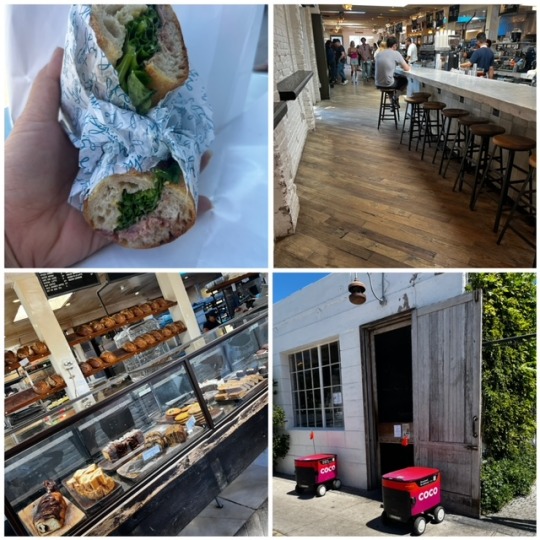
The sheer breadth of offerings at Gjusta is overwhelming and much of it is made from scratch. It’s a deli, market, bakery, coffee bar, and café with house-smoked meat, housemade condiments, housemade spreads, their own brand of coffee, etc. Grab a number and peruse the menu. They’ll call the numbers out and also show the numbers on a small display screen. Or there’s an express line if you just want pastries and bread.
The menu includes breakfast, soups, salads, small plates, flatbread pizza (sold by the slice, looked pretty flat), sandwiches, plates, and desserts. The pastries include croissants (sold out), cookies, pies, cake slices, etc. They also have whole loaves of bread and bagels (sold out). The market has honey, preserves, biscotti, Gjusta olive oil, spices, granola, nuts, etc.
Pate baguette ($16): baguette, pate, mustard, arugula, pickled red onion. Love all the ingredients but the sandwich lacked balance because the flavors were so strong. They used a lot of Dijon mustard. I like Dijon but the mustard made it hard to taste the pate. Everything was fresh and high quality. The baguette was very chewy – a tad too much so I think. It’s a small sandwich, maybe 6 inches by 2 inches.
Small case salad ($10): farro, carrots, avocado, cilantro: Deliciously nutty, creamy bits of avocado, crunchy carrots.
I’ve had their baklava croissants and biscotti before. So good. The baklava croissant is pretty sweet but that’s to be expected.
They add a 15% service charge to takeout orders and 20% to dine in checks. There is a large outdoor patio and also counter seating inside. It’s a popular place, so try not to go on a weekend. Breakfast served till 2:30 PM. Parking isn’t easy to find but it’s not as bad as Abbot Kinney.
It’s a cute older brick building with wood floors. Gjusta Goods is a few steps away. Gjusta Grocer is closer to the boardwalk. Service was friendly. Cash is not accepted.
4 out of 5 stars
By Lolia S.
#Gjusta#Venice#Gjusta baked goods#espresso bar#sandwiches#breakfast#bakery#charcuterie#deli#coffee bar
0 notes